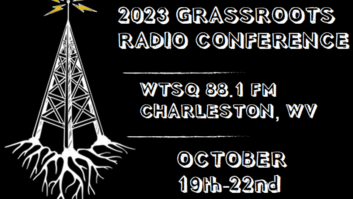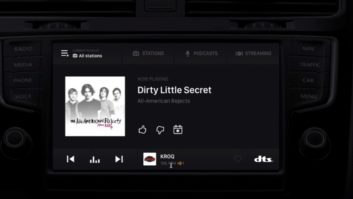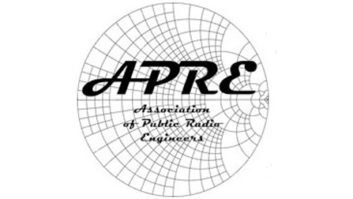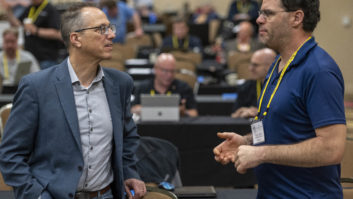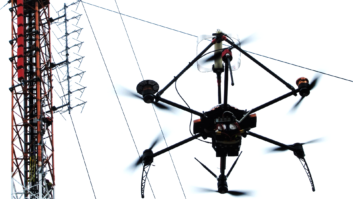
Pete Tridish’s coat contains language from the Local Community Radio Act. Some 150 community radio practitioners and supporters convened at the Urbana-Champaign Independent Media Center in Illinois in late July for the annual Grassroots Radio Conference.
Formed 16 years ago, the Grassroots Radio Coalition is a loose-knit group involved with and concerned about community radio. The GRC held its first conference in the summer of 1996, spearheaded by station leaders at KGNU(AM/FM) in Boulder, Colo., and WERU(FM) in Blue Hill, Maine.
According to a treatise written by former KGNU Station Manager Marty Durlin and former WERU General Manager Cathy Melio, grassroots radio stations are often characterized by a “volunteer-powered, consensus-oriented, community-involved model” and generally feature an eclectic range of programs.
I traveled to Champaign-Urbana by train from Chicago and made my way to the conference site. Housed in a historic post office in Urbana, the Urbana-Champaign Independent Media Center is a large, all-purpose space containing a tiny studio for community radio station WRFU(FM), along with public computers, production and art studios, a library and meeting rooms.
Functioning post office boxes still line the walls across from the radio station and the main room features grand pieces of three-dimensional artwork overlooking the cavernous space.
I arrived just in time to catch a screening of the film “Corporate FM” followed by a question-and-answer session with director Kevin McKinney. When I’d spoken with McKinney via email in April, I’d asked him if he was a radio activist; he demurred, saying that he associated that term with hippies “who only [care] about LPFM.”
Although McKinney acknowledged that he likes the idea of low-power FM, he explained that, “Any ‘penny-whistle’ sized signal is too small to do what commercial FM should be doing … I don’t see it unifying a large enough population to shape and establish a unique style of a city’s music and culture.” Since much of the Grassroots Radio Conference agenda was focused on LPFM, I was eager to see how the film would be received.
“Corporate FM” focuses primarily on commercial radio and the effects of consolidation, as well as what the director sees as the role of private equity firms in the reduction in the number of local owners. Community and college radio aren’t really mentioned. McKinney said during the Q&A that he thinks that community media works to provide the “spark” that commercial stations can then pick up and share with larger audiences, whether that spark is a new band or an underreported news story.
In his film, McKinney argues that commercial radio has the power to reach a much larger audience simultaneously, but that consolidation, voice tracking and the loss of local owners have led to a decline in the impact of radio stations within their communities. The audience was receptive, and several people (including some LPFM supporters) said they could relate to sad, first-hand accounts of fired commercial radio DJs depicted in the movie.
Low-power ahead
The following day, the main portion of the conference kicked off with a range of session options — from nuts-and-bolts panels about fundraising, audio editing and open source tools to broader youth media, policy and social justice tracks.

Norman Stockwell makes himself heard during a ‘Get on the Air Clinic’ at the GRC Conference.
Since it’s been a year and a half since passage of the Local Community Radio Act, the conference also was infused with optimism and enthusiasm about the approaching application window for new LPFM radio stations.
Prometheus Radio Project, which advocates for “participatory radio,” has been working to inform communities about the LPFM filing window, which the group anticipates will be as soon as spring 2013.
In addition to providing information and tools on its website, Prometheus has been hosting seminars around the country. As part of this outreach, Prometheus brought a crew to Champaign-Urbana to demystify the LPFM application process and to help provide a road map for stations hoping to get on the air.
The five-part “Get on the Air Clinic” outlined not only the steps that organizations will need to take in order to apply for a LPFM license, but also the basics of engineering and broadcast equipment as well as tips about station operations. Related sessions delved into broadcast law and the relationship between LPFM and social justice movements.
Danielle Chynoweth, a member of the Prometheus outreach team and a board member at the Urbana-Champaign Independent Media Center, said that Prometheus had been gathering information about groups wanting to start stations and was “looking for a face-to-face way to provide support and training.” She estimated that 35 to 40 conference attendees were from groups that are hoping to apply for LPFM licenses.
Attendees at the “Get on the Air Clinic” sessions came various states, and many expressed hope that they would be able to create new LPFM radio stations. I was struck by the range of people who were enthusiastic about LPFM —from a man who hoped to start up a LPFM station in an Illinois library, to a large group from a community center in Minnesota, to a man who operates an online-only Christian radio station.
In the first session, Chynoweth talked about radio as a “means for us to make a transformation” and said that the United States is on the cusp of the “birthing” of the “next generation of community radio.”
When in town …
During my long weekend in Champaign-Urbana, it was also a priority for me to tour as many local radio stations as I could. I carved out time to poke around the on-site station WRFU (which was largely unoccupied) and also drove to Champaign to see commercial college radio station WPGU(FM) and community radio station WEFT(FM).

A sign on the front steps of the Urbana-Champaign Independent Media Center welcomes community radio enthusiasts from across the U.S. Owned by Illini Media, a non-profit that also owns the University of Illinois’ student publications, WPGU is an intriguing place — student-run, but not the typical freeform college radio station. The music library is entirely digital and station managers schedule the playlist.
Unlike WPGU, which had no physical music library, WEFT’s walls were lined with CDs. WEFT had a cozy, more casual feel to it with sticker-covered shelves and funky artifacts. While touring the station, WEFT DJs even pre-empted their regularly scheduled programming in order to allow for an impromptu interview about the GRC conference.
Visiting stations in person gives much more of a flavor for each station’s unique personality. It’s another way to connect with and learn from other people working in radio.
In keeping with that sentiment, a big aspect of the Grassroots Radio Conference is building connections across stations. During the sessions I attended, each member of the audience offered up an introduction so that everyone had a sense of who was in the room and what they could add to the conversation.
As I trekked out of town at the end of the weekend, I was reminded of the power of gatherings like GRC. I sensed a spirit of camaraderie, not only between stations, but also between veterans and novices. Although there were certainly discussions about the challenges of radio (after outlining various pitfalls in a legal session, broadcast attorney Michael Couzens joked, “Does meatpacking seem safer than radio?”), I left this year’s GRC feeling optimistic about radio’s future.
Jennifer Waits earned a master’s degree in popular culture and pens the blog Spinning Indie. She is one of Radio Survivor’s three co-founders and has been a college radio DJ at four stations. She has been on the air at KFJC(FM) since 1998.






